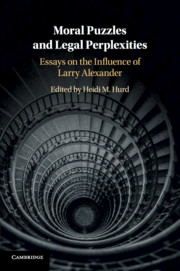Book contents
- Moral Puzzles and Legal Perplexities
- Moral Puzzles and Legal Perplexities
- Copyright page
- Dedication
- Contents
- Figures
- Contributors
- Acknowledgments
- 1 Introduction
- Part I Puzzles in Criminal Law
- 2 Kinds of Punishment
- 3 Partial Responsibility and Excuse
- 4 “Thank God I Failed”
- 5 Does Duress Justify or Excuse?
- 6 Alternative Lesser Evils
- Part II Problems in Constitutional Law
- Part III Perplexities in Jurisprudence
- Part IV Paradoxes in Moral Philosophy
- Bibliography of Works by Larry Alexander
- Index
2 - Kinds of Punishment
from Part I - Puzzles in Criminal Law
Published online by Cambridge University Press: 02 November 2018
- Moral Puzzles and Legal Perplexities
- Moral Puzzles and Legal Perplexities
- Copyright page
- Dedication
- Contents
- Figures
- Contributors
- Acknowledgments
- 1 Introduction
- Part I Puzzles in Criminal Law
- 2 Kinds of Punishment
- 3 Partial Responsibility and Excuse
- 4 “Thank God I Failed”
- 5 Does Duress Justify or Excuse?
- 6 Alternative Lesser Evils
- Part II Problems in Constitutional Law
- Part III Perplexities in Jurisprudence
- Part IV Paradoxes in Moral Philosophy
- Bibliography of Works by Larry Alexander
- Index
Summary
- Type
- Chapter
- Information
- Moral Puzzles and Legal PerplexitiesEssays on the Influence of Larry Alexander, pp. 23 - 38Publisher: Cambridge University PressPrint publication year: 2018
- 2
- Cited by

